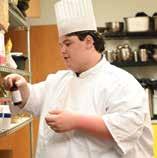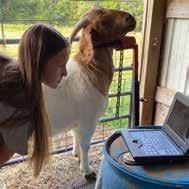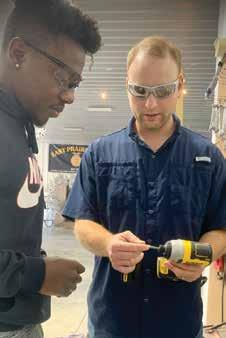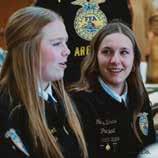Preparing for Success









Growing wise and informed consumers. Assisting with workforce development.
Meeting the needs of traditional and non-traditional agricultural education students.
Helping students develop practical and leadership skills.
P.O. Box 480, Jefferson City, MO 65102 Phone: 573.751.3544
State Staff:
Teresa Briscoe, Lee Crabtree, Marie Davis, Keith Dietzschold, Lisa Evans, David Higgins & Jim Spencer
Communications Consultant: Joann Pipkin | Show Me Agri-Comm
Missouri FFA Association
Missouri FFA Alumni & Supporters
Missouri FFA Foundation
Missouri Professional Agricultural Student Organization
Missouri Vocational Agriculture Teachers Association
Missouri Young Farmers & Young Farm Wives
The Department of Elementary and Secondary Education does not discriminate on the basis of race, color, religion, gender, gender identity, sexual orientation, national origin, age, veteran status, mental or physical disability, or any other basis prohibited by statute in its programs and activities. Inquiries related to department programs and to the location of services, activities, and facilities that are accessible by persons with disabilities may be directed to the Jefferson State Office Building, Director of Civil Rights Compliance and MOA Coordinator (Title VI/Title VII/Title IX/504/ADA/ADAAA/Age Act/GINA/USDA Title VI), 5th Floor, 205 Jefferson Street, P.O. Box 480, Jefferson City, MO 65102-0480; telephone number 573-526-4757 or TTY 800-735-2966; email civilrights@dese.mo.gov.
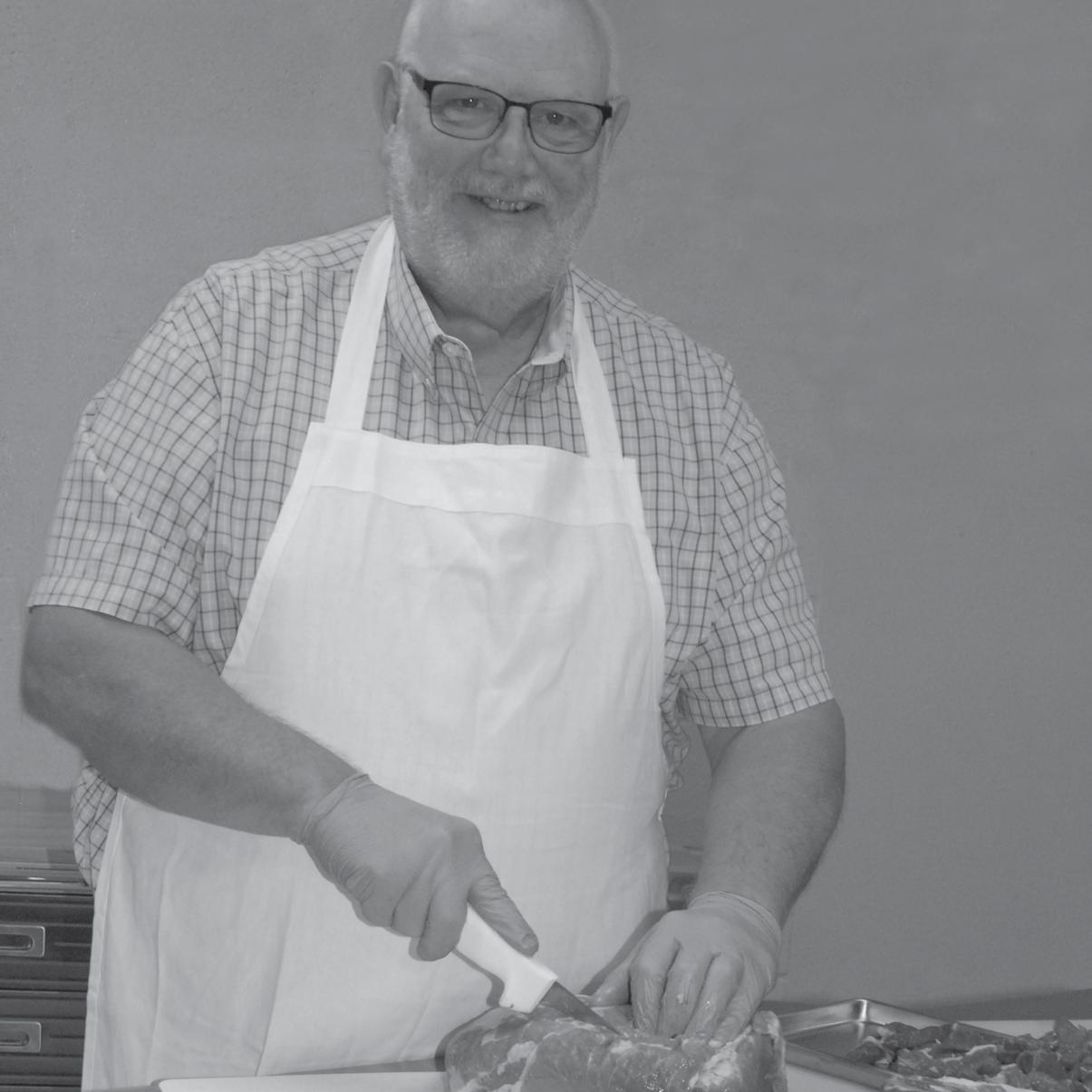
KEITH DIETZSCHOLD Director
Agricultural Education Missouri Department of Elementary and Secondary Education

Agricultural education prepares students for successful careers and a lifetime of informed choices in the global agriculture, food, fiber and natural resources systems.
gricultural education is intertwined with the success of the Missouri agriculture, food, and natural resources industry. Investment in this area of education is unique and meant to grow wise and informed consumers, assist with workforce development, meet the needs of traditional and non-traditional agricultural education students, all while helping those students develop practical and leadership skills.
Technological advancements and shifting consumer demand continually transform agriculture. While changes progressively lead to increased productivity and innovation, the result is a critical challenge: a shortage of skilled workers. This shortage spans from production and business roles to research and development.
Today’s agriculture relies on technology, from drones and robots to artificial intelligence. An aging farming population currently retires faster than new workers can enter the industry. Similarly, the need for scientists, engineers, and data analysts to drive innovation in agriculture has outstripped the available supply of qualified candidates.
To address this workforce gap, it is essential to focus on training and education. Agricultural education programs must expand to include courses on emerging technologies, sustainability and business management. This will prepare students for the diverse roles required in modern agriculture. Integrating science, technology, engineering, and mathematics into agricultural curriculum is also crucial for fostering a new generation of professionals capable of advancing the industry.
Strengthening partnerships between agricultural businesses and academic institutions can create a direct pipeline of talent. Internships, work-based learning opportunities, apprenticeships, and research collaborations offer students valuable hands-on experience and a clearer pathway into the workforce.
The future of agriculture depends on the leaders we prepare today.
Let’s continue to work together to accomplish these goals.
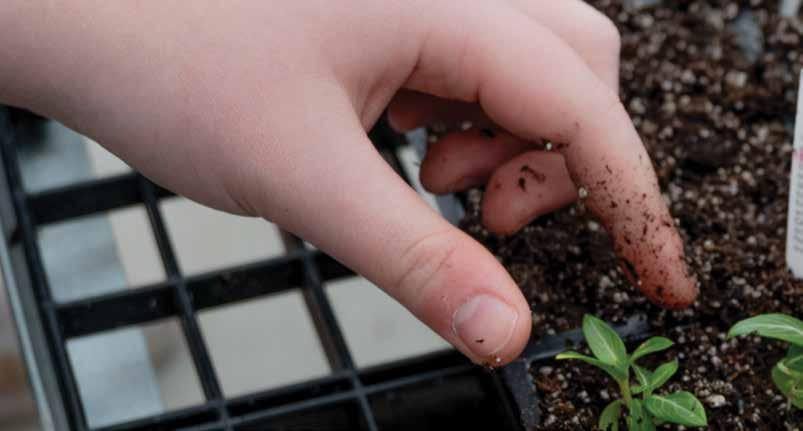





Through classroom laboratory instruction, agricultural education students use unique problem-solving skills.
Ag education students gain handson experience outside the classroom through their Supervised Agricultural Experience (SAE) .
Leadership development activities through involvement in FFA, PAS, Young Farmers/Young Farm Wives and MVATA promote personal skill development.
361
5,243
31,575 Students enrolled in Missouri agricultural education programs. Missouri agricultural education programs. High school agricultural education graduates in 2022.
To secure strategic partnerships and financial resources to enhance, strengthen and support the educational and leadership opportunities that promote premier leadership,
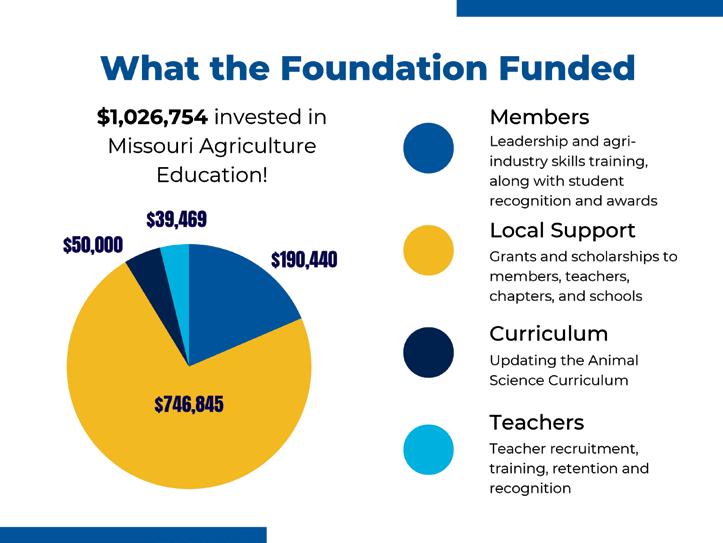

was a leap year in more ways than one. The year brought Missouri FFA Foundation to life! It started in January with Missouri’s own National FFA Officer, Grant Norfleet, expressing his thanks that the Foundation was funding Missouri’s agricultural education leadership programs, such as Greenhand Motivational Conferences and HYMAX. Those programs are what started him down the path to national leadership. In March, tears of joy filled Gallatin ag teacher Amy Holder’s eyes as she received the surprise announcement of being a finalist for the Foundation’s Golden Owl Award.
April brought the Missouri FFA State Convention. Seeing the excitement of Missouri FFA members as they were recognized for their hard work with awards funded by the Foundation’s sponsors was exhilarating. In July, at the MVATA Conference, sheer jubilee enveloped one teacher with the foundation funding a food science lab for her program, while another was bubbling over with his enthusiasm to show pictures of the skid steer the Foundation had helped his program buy.
Executive Director
Missouri FFA Foundation
573.881.7898
heather@missouriffa.org
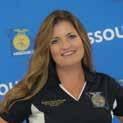
At the Missouri State Fair, a parent expressed gratitude for the SAE grant her child had received. Without the grant, the student wouldn’t have been able to launch a project that was quickly growing into a thriving small business. This celebration is driven by the more than $1 million the Missouri FFA Foundation has invested in Missouri Agricultural Education this past year. It’s you, our sponsors and donors, who makes all these moments possible. From providing agriscience training for teachers to offsetting the cost of state conventions and conferences, to giving students grants for SAE projects, or helping fund other program needs, the Foundation is truly facilitating opportunities for leadership, personal growth and career success for Missourians in agricultural education. Thank you for making that possible!
We look forward to even bigger growth and greater accomplishments next year.
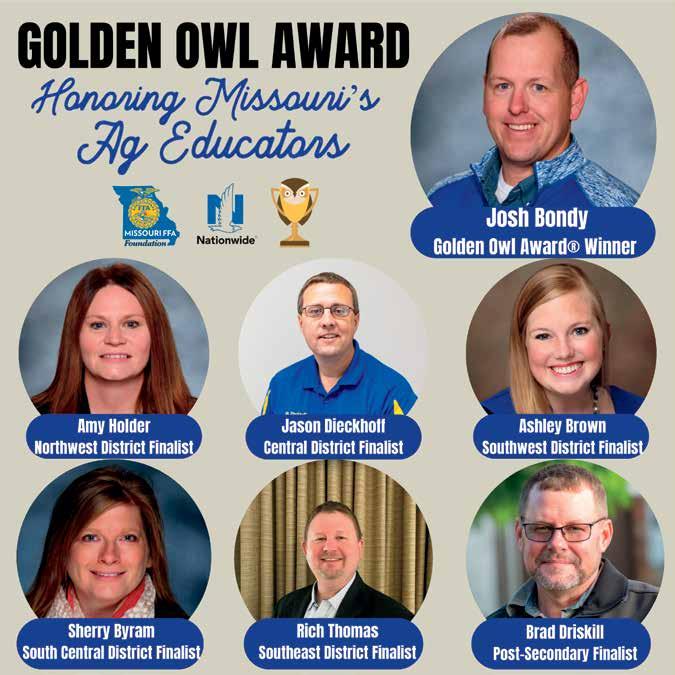
From individual student SAE Grants ranging from $500 to $1, 000 to Horizon or Rising Sun Grants for schools of $10,000 to $50,000, the goal is to increase opportunities for high-quality agricultural education experiences. Below and on the next pages are examples of how those funds have benefitted Missouri Agricultural Education programs and students through a variety of projects.
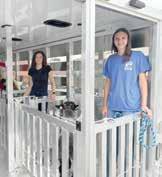
Nearly $747,000
in funds allocated through grants and scholarships for students, teachers, FFA chapters and agricultural education programs.

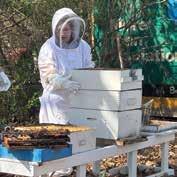


Glasgow FFA member Tyler Barringhaus (below left) owns and operates an agricultural communications business where he showcases Missouri farmers’ stories and their everyday lives. With an SAE Grant, he was able to purchase a drone and a GoPro camera to continue educating others worldwide.
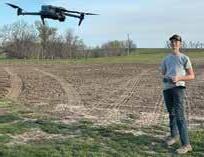
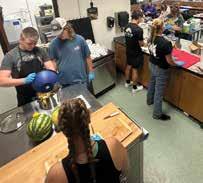
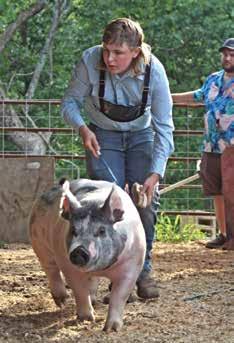
Savannah FFA member Maren Heckman (previous page, bottom photo) grows a variety of fruits and vegetables for her SAE. After harvest, she sells her produce fresh and in the form of homemade canned goods. An SAE Grant allowed her to add irrigation to 100 blueberry and 50 raspberry plants, dramatically increasing her production while lowering her time spent on plant care.
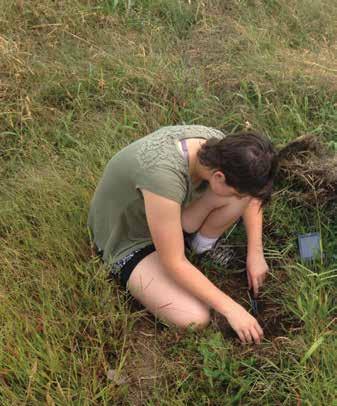
Food processing and preservation was a growing area of interest for Newton County. Students even petitioned the Seneca R-VII (left, center) school board to add food science classes to their ag program. Even though the classes were approved, the high school didn’t have the facilities or equipment to adequately teach the subject. A Rising Sun Grant of more than $37,000 helped address that need. While the school covered the cost of renovating the ag program instructional area, by merging local donations with the grant funds, the program was able to purchase large equipment, such as a stove and range, a dehydrator, a smoker, a refrigerator, a washer and dryer, a curing shed and a dishwasher, along with smaller kitchen items, such as canners, knives, steamer baskets and vacuum sealers.
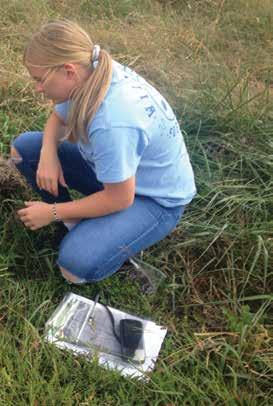
East Prairie High School (page 11, top left) was challenged by a growing student interest in animal science and lacking the facilities and funding to complete corresponding SAEs. East Prairie’s instructor knew students could benefit from an expansion of the school’s Agri-science Center to allow classroom instruction and projects focused on animal science. A Rising Sun Grant of more than $32,000 helped address that need by supporting the purchase of an Exiss Livestock Low-Profile Gooseneck 720A trailer, livestock handling chute and other handling equipment.
Cass Career Center (left) capitalized on a Learning by Doing Grant to purchase five Garmin eTrex® 22x Rugged Handheld GPS units to use in their Precision Ag Unit to move instruction from a theoretical perspective to practical, hands-on lessons. Now students will be able to mark waypoints in the field where soil samples have been taken, which can be overlaid on soil, yield and topographical maps. Doing so helps students understand the power of data in agriculture and practice data-based decision making.
When assessing community needs, the Willow Springs R-IV High School Ag Program (previous page, left center photo) found there was a great need for employees with welding experience. The program had a new building where welding instruction could be offered, but it needed to be outfitted. That’s where a $20,000 Horizon Grant came in. The grant funds allowed the program to create a new welding area that exceeds industry standards, featuring state of the art multiprocessor welders, individual welding booths, independent updraft exhaust systems and multi-positional welding tables.
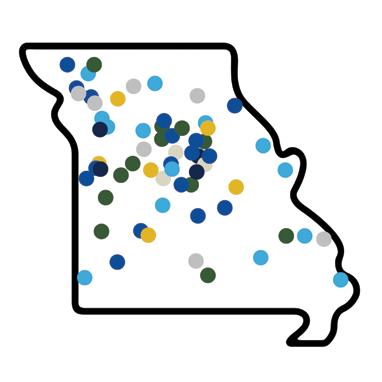
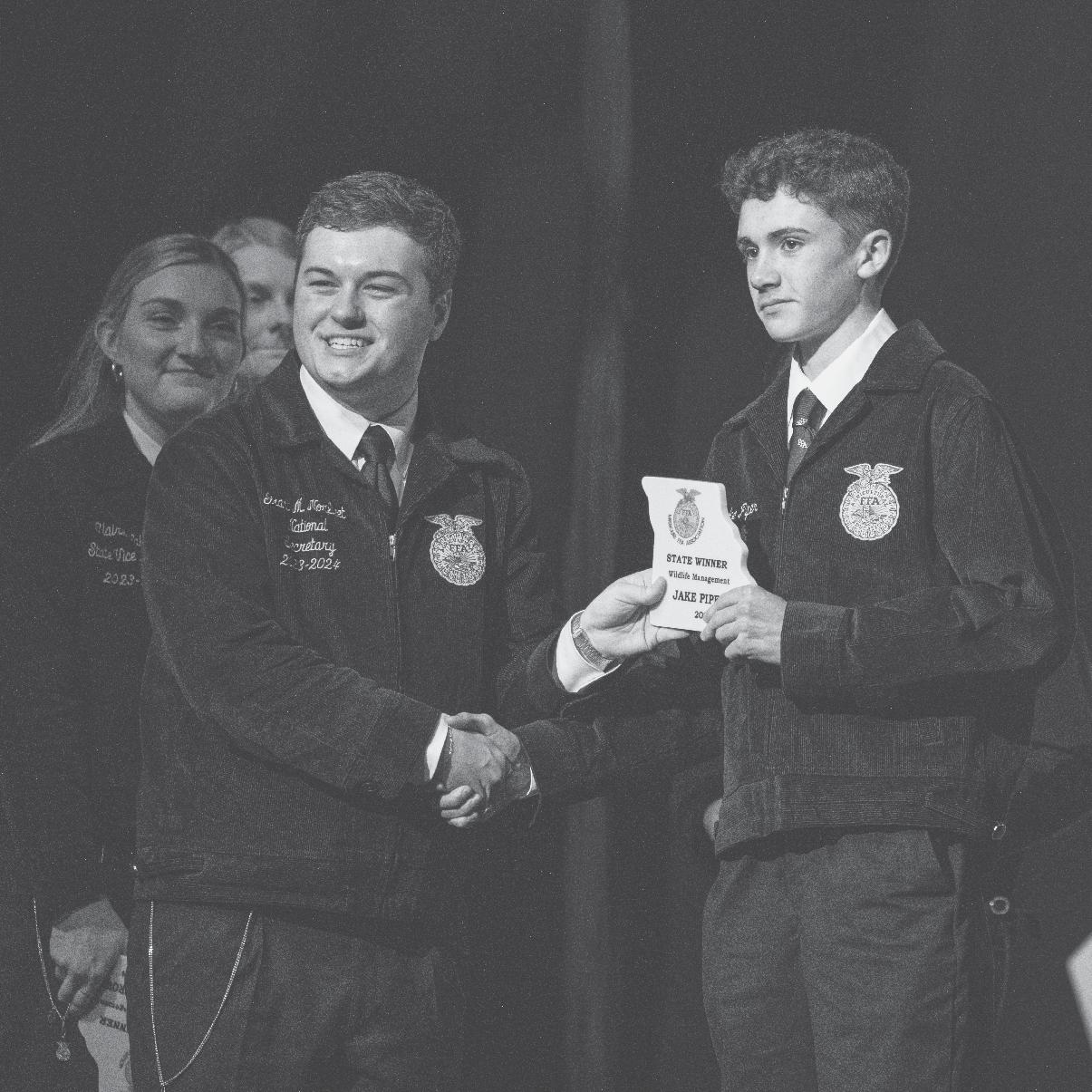
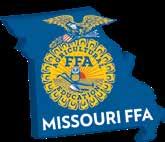
believe in the future of agriculture...” This basic phrase – that most of us have heard more times than we can count – often gets skimmed over when talking about FFA and Agricultural Education. However, when we truly pause to stop and soak in what these seven words have to offer, we realize they hold a lot of power. Believing in the future of agriculture is so much more than a catchy intro to the beloved FFA Creed. It is about the values, ideals and dedication the Agricultural Education family has instilled in the next generation of agriculturalists. It is about developing, promoting and supporting the future of agriculture in America.
By pouring into the next generations of leaders in our industry, we’re pouring into their and our industry’s future.
State President
Missouri FFA Association
andi.belt@missouriffa.org
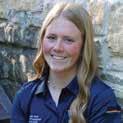
I’ve been lucky enough to have had the best support system throughout high school and into this year of service. I’m so grateful for a family at home that was the best group of cheerleaders and truly never stopped helping me chase my dreams. I was blessed with advisors who never stopped pushing me and challenging me to be the best version of myself. Lastly, I was lucky enough to have teammates, friends and fellow officers who were the ones who helped me make the most out of each opportunity. My story is just one of nearly 27,000 FFA member stories from across the state of Missouri. This belief in the future of agriculture shows exactly why our industry is thriving. The countless individuals in our industry that pour into the next generation are what make this industry and organization so special for all of us.
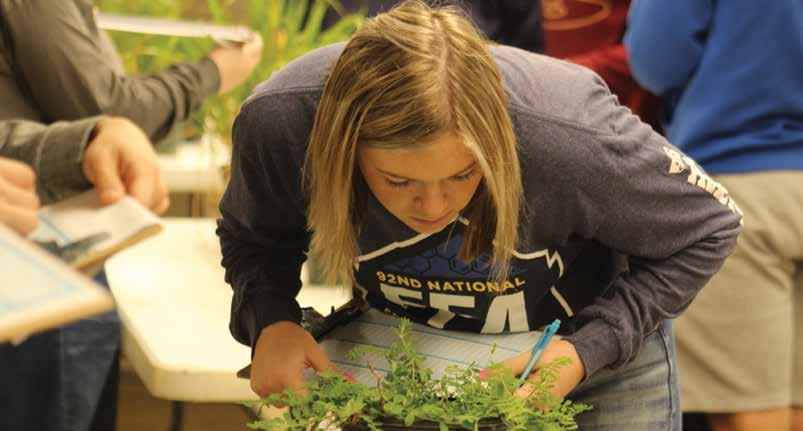







361
FFA Chapters Agricultural Education Teachers
26,968 588 Missouri FFA Members
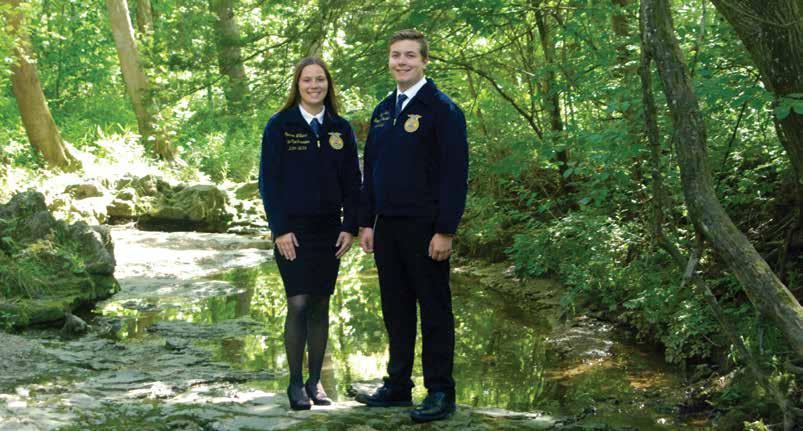
Learning to Do. Doing to Learn. Earning to Live. Living to Serve.
No. 1 in American Degree recipients.
Aurora and Troy named Top 10 Model of Excellence chapters.
Marshall FFA received top honors in the #SpeakAg State Showcase.
Gianna Mahsman, Palmyra, named high individual in national Food Science Career Development Event.
Brayden Selgeby, Neosho, earned high individual honors in national Poultry Evaluation Career Development Event.
Nash McKenzie, Boonville, named the National Winner in Diversified Horticulture Production Proficiency.
fter completing three agriscience projects, Missouri FFA’s 2024 Star in Agriscience Abigail Burns has learned the ins and outs of conducting research. A member of the Gallatin FFA Chapter, Burns has found a passion for agriscience with plans of turning it into her future career.
“I have gained knowledge of the scientific method, data recording, finding trends and statistical significance,” Burns shares. “During my first project, I leaned on my agriculture teachers, science teacher and math teachers to help guide me through the process of setting up an agriscience project design. Through my next two projects, my role transitioned from student to scientist.”
After projects in plant, animal and natural resource science research systems, this up-and-coming scientist has drawn diversified conclusions that could impact several sectors of the agricultural industry.
In her plant science research, Burns increased germination rates of oak acorns used in regeneration efforts. Using the scientific method, she tested nearly 40 acorns from pin oak trees to determine germination success –half in a control group and half treated with gibberellic acid (GA). After a 30-day growing period, the results led Burns to accept her hypothesis that GA increases germination rates.
In her natural resources project, Burns injected fungicide into oak trees in close proximity to oak wilt infected trees.
“I found injecting fungicide into the vascular system of healthy trees prevented the spread of oak wilt through root grafts,” she says.
Burns’ animal science research project was a little more personal. Her animal systems research SAE helped her discover why pigs in her swine herd were contracting E. coli.
“I tested the use of gentamicin as a preventative of E. coli. I found the treated group to be 100% E. coli free, while the control group had more than a 50% infection rate. I accepted my hypothesis and concluded that gentamicin could be used to prevent E. coli in nursing swine.”
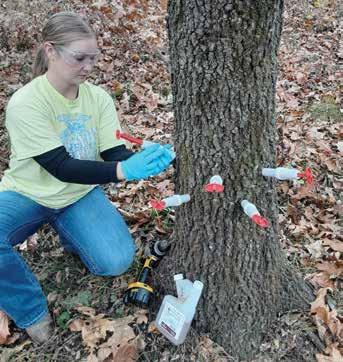
Burns plans to continue this type of research in the future. After studying plant and animal science research in college, she hopes to pursue a career with a company that specializes in plant research, allowing her to grow from student to scientist once again.
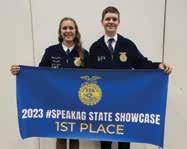
1st Place, 2023 National FFA Convention
#SpeakAg State Showcase
a world where every generation is increasingly removed from production agriculture, sharing the stories of our industry is becoming more important. Marshall FFA members Gentrie and Gage Davis took on National FFA’s challenge to do just that and were named the #SpeakAg State Showcase winners at the 2023 National Convention.
In the competition, members were asked to create a short video highlighting agriculture in their state. Videos could showcase top commodities, diversity in agriculture, FFA members, ag careers and more.
“Gage and I were interested in participating in the #SpeakAg Showcase because we had already been doing videography for our family’s ag business,” Gentrie Davis shares. “We knew with the resources and mentors we had access to, we could create a quality video showing our favorite aspects of Missouri agriculture.”
Their nationally awarded video was well researched and included input from real faces of agriculture in their community.
“Our script consisted of interviews with local agriculturalists in our area,” Davis explains. “We did a

total of five interviews from different aspects of agriculture. To capture Missouri agriculture on a broader scale, we wanted to highlight our state’s production rankings nationally. We used Missouri Department of Agriculture as a source to prove the impact our state’s agriculture has nationally and worldwide.”
The heart behind their video boiled down to one phrase – “Missouri truly is the heartland of agriculture.”
“Creating this video was important to our chapter and community because it was a small view of what we are a part of as a whole,” Davis says. “This video showed what we do as agriculturalists at the local level leaves a trademark on the broader picture of our state.
Davis adds the real take away was the message it sent other members of their chapter.
“We wanted to show (our chapter) they could do great things with the resources and mentors they have available locally … we all can.”
(photo at right, l-r) Claire Walker, Carmen Wilburn, Gentrie Davis, Annabelle Carlisle, Kennedy Heil, Mikaela Rojas, Kade Jenkins, Langston Mitchell, Gavin Rhode, Madilynn Wehmeyer, Jackson Rhine, Emma Robinson, Matthew Lakey, Amelia Hawkins, Braden Havlik, Andi Belt and Alexis Mullins.

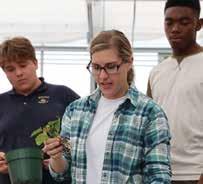
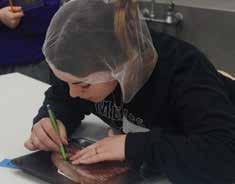
The Missouri FFA Foundation and Missouri Agricultural Education appreciates the support of the following presenting sponsors:
Missouri FFA State Officer Program—CanAm
Missouri FFA HYPE Academy—Missouri Corn
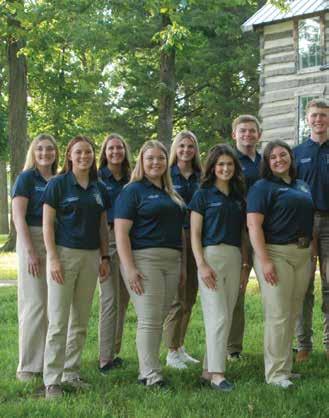
Students whose lives are impacted by FFA and agricultural education will achieve academic and personal growth, strengthen American agriculture and provide leadership to build healthy local communities, a strong nation and a sustainable world.
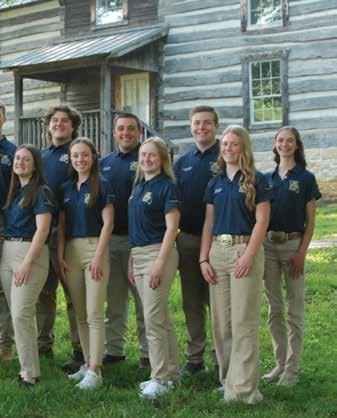

industry is only as strong as its up-and-coming leaders. Those leaders in the agricultural industry are filled with passion, knowledge and drive –qualities Missouri FFA works to further instill through its Helping Youth Maximize their Agricultural eXperience (HYMAX) Academy for the top 100 freshmen FFA members across the state.
From professional development to advocacy, this threeday academy provides a well-rounded look at both FFA and the ag industry as a whole.
“At HYMAX, you will participate in activities to meet and get to know fellow students,” says Keenan Kleiboeker, a sophomore Pierce City FFA member. “You get to hear from and talk to people who have based their whole career off of agricultural advocacy. These people talk about how to approach someone, how to discuss a topic and ultimately how to be effective at teaching someone who may not have the same ideas or beliefs as you.”
Kleiboeker attended HYMAX in 2024. Throughout the academy, he worked with an assigned small group to research a topic in agriculture and create a video to share with others.
“In addition to meeting new people and learning from professionals in agriculture, we also got to learn how to be effective communicators through video,” Kleiboeker shares.
“After a weekend full of learning about advocacy, we got to put together a presentation with our groups and advocate to everyone else about an ag topic.”
He plans to use the skills gained in his daily life.
“I actually just started a YouTube channel named ‘A-OK Farms,’” Kleiboeker explains. “I was very interested in learning more about how to connect with consumers through my videos. HYMAX taught me just that.”
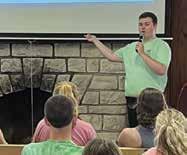
Mexico, Missouri
2023 -24 National FFA Secretary
rant Norfleet remembers exactly where he was sitting when he first thought he would someday like to serve as a National FFA Officer.
As a freshman attending National FFA Convention for the first time, he was in awe of the atmosphere.
“I saw David Townsend, the national president from Delaware, on stage, and that was my first experience in blue corduroy,” Norfleet explains. “I was like, ‘Man, that dude is so cool. Who is that? How did he get to do that?’”
Perhaps the most defining moment for Norfleet, though, came during his year of service as a Missouri State FFA Officer.
“I really enjoyed the experience as a state officer, and I was wanting to give back and serve students still,” Norfleet says. “You don’t recognize what you have or the great experiences you have until you don’t have them anymore.”
As the 2023-24 National FFA Secretary, Norfleet has embraced his year of service. During his year of

service, the former Mexico FFA member has worked to be a voice for students, listening for their insight and input through workshops, leadership programs and other events across the country.
Norfleet has his sights set on a career in agricultural education and curriculum development. He has enjoyed gaining a broader knowledge and understanding of classrooms across the country during his term.
Growing up on a small family farm in Audrain County, Norfleet showed beef cattle and developed an agricultural education service-learning SAE, which helped cultivate his passion for learning.
“FFA has taught me to simply meet people exactly where they’re at for exactly who they are,” Norfleet says. “FFA does a great job of community building. It’s provided me a sense of comfort in getting to know folks, and that’s all through community and relationship building.
The Centralia FFA Chapter Program of Activities focuses on meeting the needs of our members, our community and the agricultural industry. Centralia is a close knit agriculturally-based community. Each day our members are challenged to make the world we live in a better place. Our members take great pride in helping our community be the best little town in Missouri. Because we are an agriculturally-based area, we know the economic success of our community is dependent on a strong and vibrant agriculture economy. Our officers challenge members to build a better community by building a strong agriculture industry.
— Scott Stone, Centralia FFA Chapter Advisor
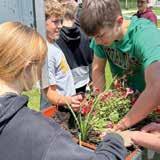
MODEL OF INNOVATION WINNER Growing Leaders Building Communities
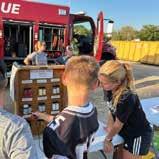

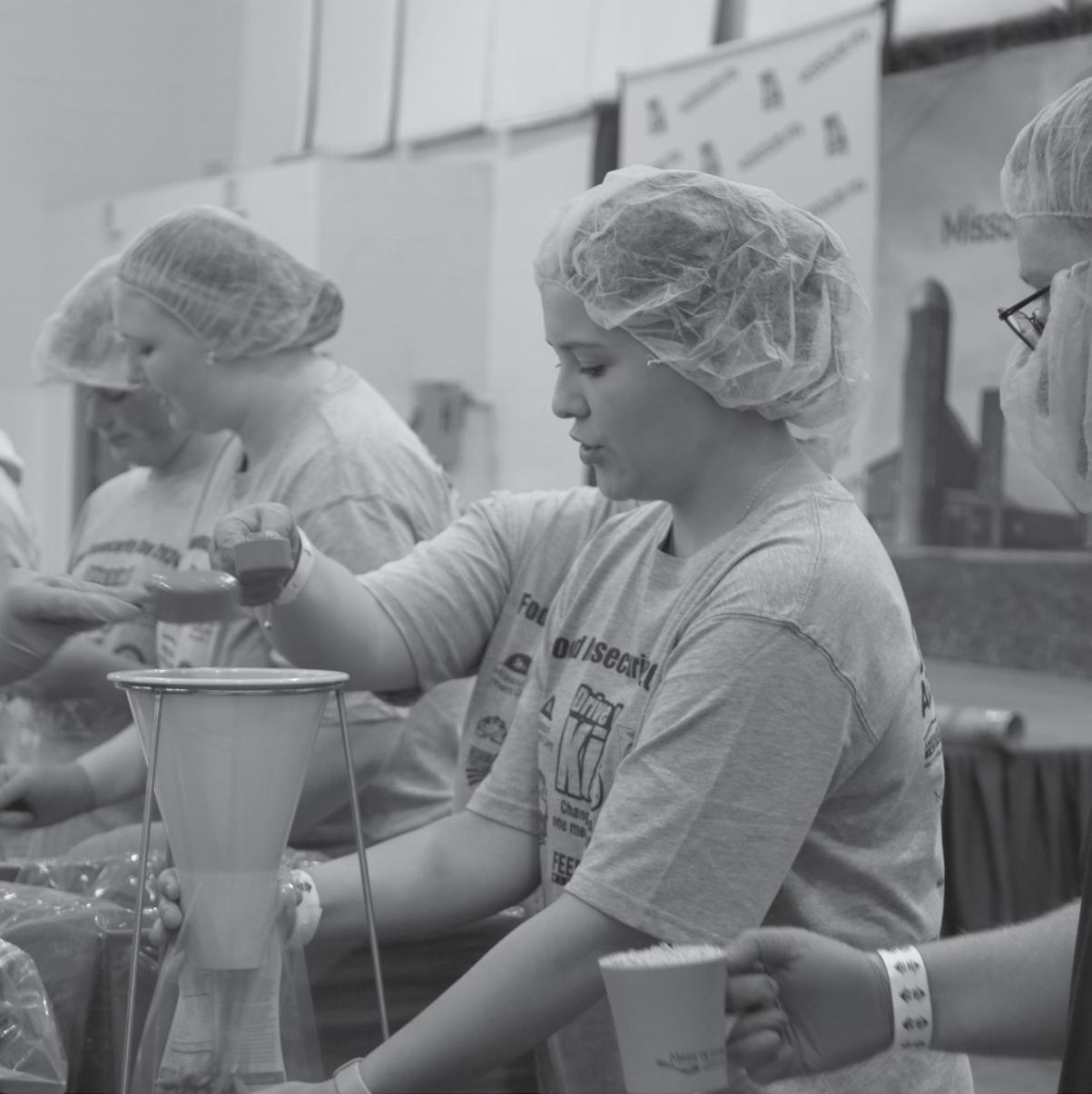
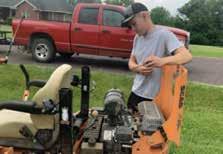
Find a job you enjoy doing, and you will never have to work a day in your life.
Writer Mark Twain might have coined the phrase, but it’s one Boonville FFA member Nash McKenzie lives thanks to the Supervised Agricultural Experience (SAE) he started while in high school.
The now State Fair Community College student has come to enjoy the lawnmowing and landscaping business he launched in 2019. In fact, he enjoys the trade so much that he’s made it his full-time job and has plans to continue the business in the future.
Growing his SAE helped McKenzie earn a national proficiency award in Diversified Horticulture at the 2023 National FFA Convention. His business, NJs Lawncare, provides mowing, landscaping and mulching services and employs two workers in addition to McKenzie.
McKenzie broadened his knowledge of financial management, taxes, insurance, billing and machinery
Diversified Horticulture Proficiency Award

maintenance with the help of his agricultural education instructors and his father, a local business owner.
“I use Quickbooks to manage my employees, income, expenses, tax liability, loan repayment and additional business operations,” McKenzie says.
Communicating with customers and employees has been key in the success of McKenzie’s business. He says clear communication with clients helps ensure customer satisfaction and leads to repeat business. He also constantly networks with employees to ensure they are representing NJs Lawncare through customer satisfaction and quality of work.
“Hiring employees, tracking costs, determining service fees and seeking advice from my dad about insurance, taxes and billing continues to better prepare me for the future and long-term success of my business,” McKenzie notes.
In addition to operating his business, McKenzie is enrolled in online business management and accounting classes. He says the coursework will continue to help improve his knowledge and skills for further business expansion.
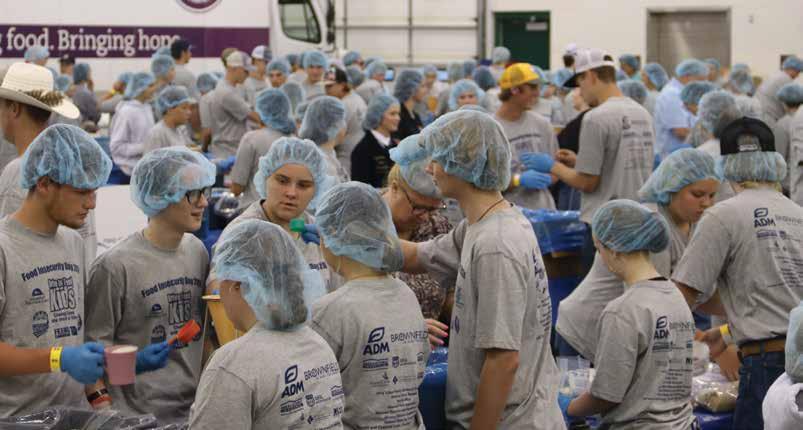
17,450+
4,962 Chapters Receiving Grants 41 Service Hours
$540,950 Volunteers
Growing the next generation of leaders who will change the
123 Chapters Participating in Service Activities

ECONOMIC IMPACT
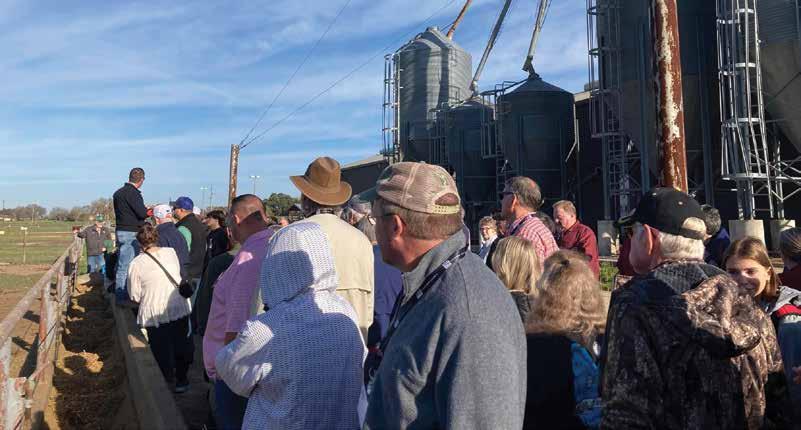
2,947 adults enrolled in 2023-24.
18 schools with active Young Farmers/ Young Farm Wives chapters in 2023-24. State Membership: 375.
Agriculture instructors in 22 schools had part or all of their time scheduled for adult instruction in 2023-24.
More than 150 farm families enrolled in the Farm Business Management Analysis program.






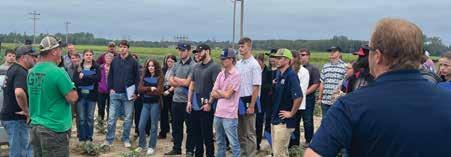
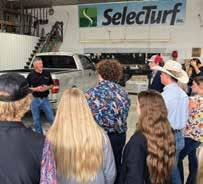

The Missouri FFA Foundation and Missouri Agricultural Education appreciates the support of the following presenting sponsor:
Missouri PAS State Conference
FCS Financial
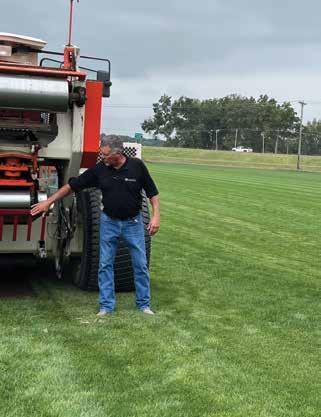
Crowder College
Mineral Area College
Missouri State University-West Plains
Moberly Area Community College
North Central Missouri College
Northwest Missouri State University
Ozarks Technical Community College
St. Charles Community College
St. Louis Community College
State Fair Community College
State Technical College of Missouri
Three Rivers Community College
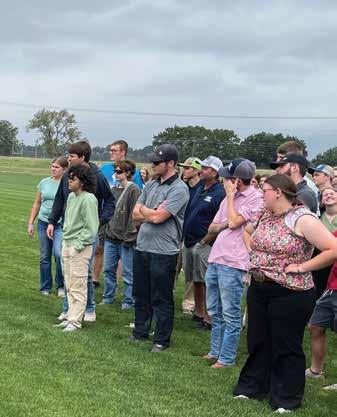
President: Aubrey Embry
State Fair Community College
Secretary: Elijah Holenda Crowder College
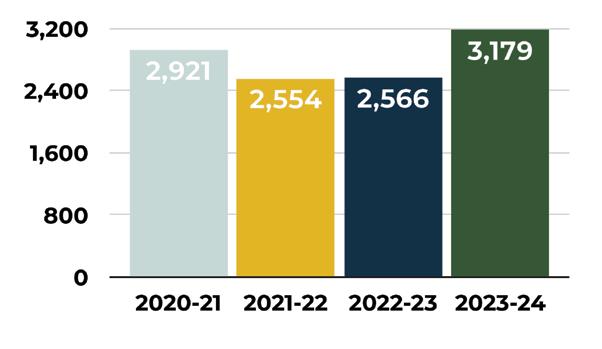
rom industry involvement to skill development and industry networking, Payton Rodgers’ hands-on experience in beef production has her better prepared to enter the agriculture industry as an adult.
The 2024 State Star in Placement works for Rodgers Livestock, a diverse show cattle operation owned by her father. While her role in the operation began with basic animal husbandry skills, such as feeding, healthcare, fence repair, fitting and picture preparation, she has since taken on product inventory, marketing and promotion responsibilities.
“As my responsibilities grew, my wage increased,” Rodgers explained.
A 2024 graduate of Savannah High School, Rodgers says the greatest challenge she encountered with her SAE was managing her own personal expectations and understanding that the skill set she was learning takes patience and years of experience to master.

“My personality is one of wanting to be a necessary perfectionist,” Rodgers explains. “This creates frustration and anxiety at times as I work to master the skills necessary to excel in this industry.”
Rodgers discovered the best way to overcome those challenges was to work hard, follow examples of industry leaders, ask questions, don’t get discouraged and never give up.
While in high school, Rodgers served as a chapter and area FFA officer. She was also a member of state Career Development Event teams, received state proficiency awards and is a past member of the Missouri AgriBusiness Academy.
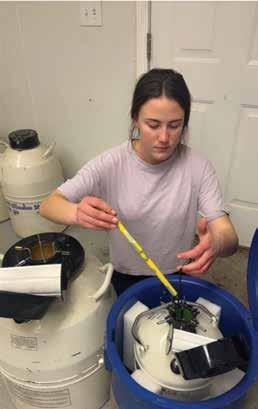
High school agriculture classes and her beef cattle SAE provided Rodgers a solid foundation that will benefit her in college and in the industry in the future. She currently attends Redlands Community College and competes on the Livestock Judging Team while working toward a double major in agribusiness and agriculture communications.
“The opportunities through my SAE and FFA leadership activities have given me the confidence to pursue my goals,” Rodgers says.
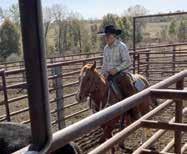

a young boy, Crayton Schwieter watched his dad train horses. One by one, the youngster used the horses on the family’s ranch until each was sold. Once he was in high school and could drive, Schwieter picked up the trade himself and began training horses on his own. The South Shelby FFA member has turned the lifelong craft into his SAE, finding a passion that truly pays. In fact, Schwieter was named the State Star in Agribusiness at the 2024 Missouri FFA Convention.
“I have learned from watching and helping my dad for many years, as well as from repeated training on my own,” Schwieter says. “I am now able to train horses to be disciplined in a wider variety of skills and am also more efficient at training.”
For example, Schwieter says he can train a client’s horse in about a month on average, improving the turnaround time from two months for the same skills when he first began the business. Schwieter’s agribusiness SAE is three-fold. In addition to training, the entrepreneur also buys and sells horses and provides custom-cattle work for area farmers on horseback.
“Every horse that I train has different needs and training requirements,” Schwieter explains. “To overcome the challenges, I have to analyze the horse and assess the training method that I should try if my first option doesn’t work.”
Schwieter purchases horses with little or no skills, so well-designed and maintained facilities are a must to help him accomplish his training goals. He is also diligent with recordkeeping so buyers can be informed on their purchases.
A 2024 high school graduate, Schwieter is studying agribusiness at North Central Missouri College in Trenton. He plans to have a career in agribusiness in the future and continue his equine operation.
When owning a business, you have to be able to
manage it wisely,
Schwieter says. “There are many advantages in training horses. The best one is that I get paid to interact with horses and that is my true passion in life.”
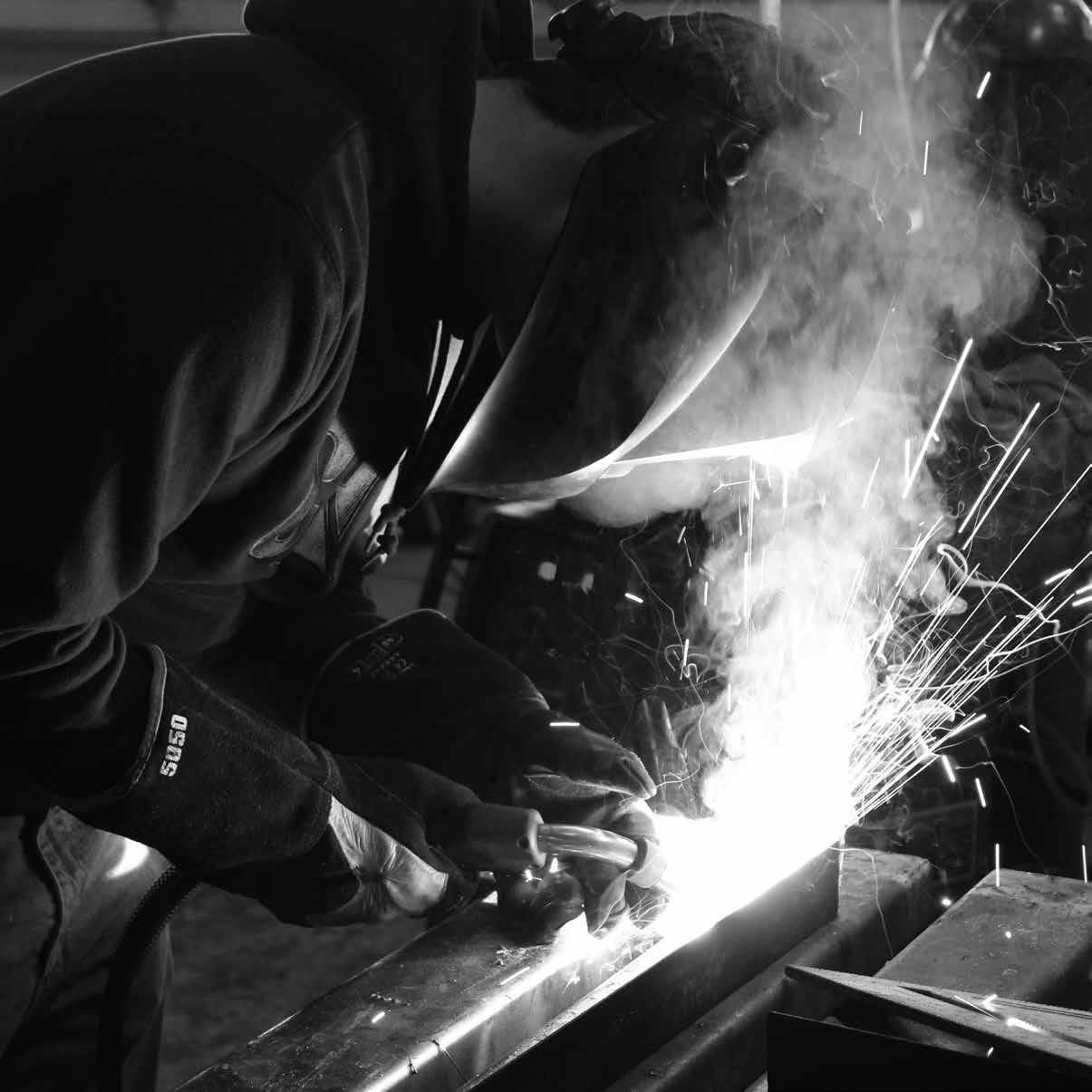
At Ashland, we consider chapter, school and community needs when developing our program of activities. We always brainstorm ways to make activities more effective and different from the year before. To prepare students to help strengthen the agricultural industry, we provide real-life hands-on experiences. These experiences can be working with industry leaders, learning agriculture topics in the classroom and teaching others about the agricultural industry.
— Rebekah Hammett, Ashland FFA Chapter Advisor
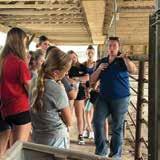
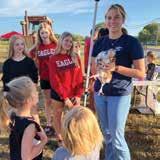
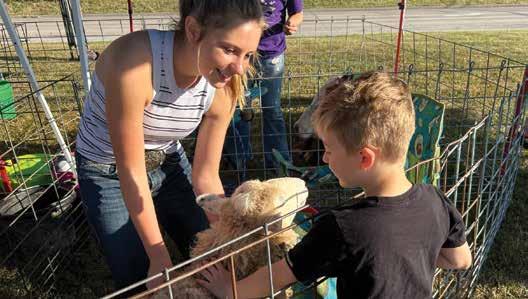
might say Trenton FFA member Cade Claycomb did his SAE homework.
Through careful study of sire characteristics and talking with industry professionals, Claycomb worked to select high-quality sires to breed to his Jersey females. From the start of his SAE, the young farmer focused on developing top-notch genetics. He worked with Trans Ova Genetics through the invitro fertilization process to breed most of his registered cattle. The plan paid off as Claycomb was named Missouri’s 2024 Star State Farmer.
“The process allowed me to increase my herd size quickly by using recipient cows to carry higher-quality embryos,” Claycomb explains. “As I have increased my herd size and achieved high genetic quality, I’ve been able to show my own registered Jerseys at the Missouri State Fair and a few local fairs. This has given me the ability to showcase my best stock and see how they compare to other breeders in the area and state.”
In addition to his herd of registered Jerseys, Claycomb also manages a small Angus cattle operation. In both beef
and dairy enterprises, Claycomb is responsible for feeding and managing cows and calves, as well as record-keeping.
Keeping up the multitude of tasks in a diversified farm can be challenging. It’s especially challenging for Claycomb as he balances farm responsibilities with school and extracurricular activities.
“Another challenge is feeding dairy cattle versus beef,” Claycomb says. “My beef cattle do not need a lot of attention when it comes to feed, but making sure there is pasture and mineral available is very important. However, dairy nutrition is especially important for developing quality heifers and keeping milk production high.”
To help ensure his herd is fed appropriately, Claycomb consults with a nutrition company. He says his SAE allows him the opportunity to network with individuals in the dairy industry.
“By attending cattle shows and the National Jersey Youth Academy, I have been able to form connections with individuals who share the same passions as I do,” Claycomb says. “In addition, I can learn about policy related to the industry. It is such an eye-opener to see how many people are actively involved in the dairy industry and their willingness to help advocate and improve the way it operates.”
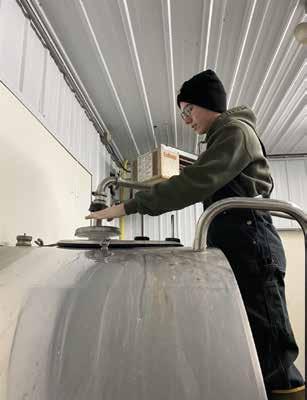
Claycomb attends Oklahoma State University where he is pursuing a bachelor’s degree in agricultural communications with a minor in ethical leadership. He plans to return to his family’s dairy farm to expand his operation and serve as an advocate for the dairy industry.
5,243 High School Ag Education Graduates in 2022.
<1% not available for employment
<3% could not be found (status unknown)
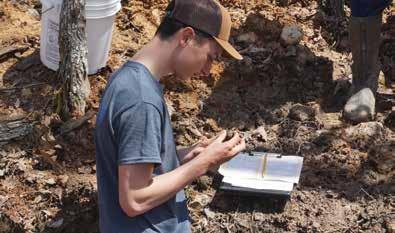

Employability Story
State Average Salary $62,407
New (First Year) Teachers in State 25
Temporary or Other Certifications 28
Re-entering the Profession 17
Teachers Coming from Out of State 2

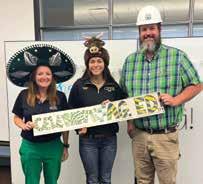
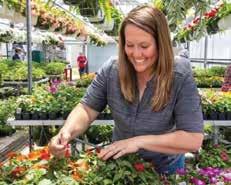
The Missouri FFA Foundation and Missouri Agricultural Education thanks these presenting sponsors:
Missouri Teach Ag Program—MFA Foundation
The Missouri Teach Ag Program is funded in part by CHS Foundation and MVATA.
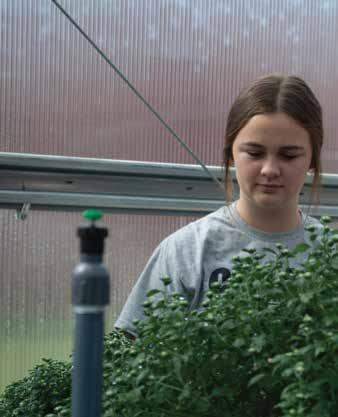
College of the Ozarks
Haley Bakeberg
Danielle Walters
Missouri State
Colin Boyd
Aubrey Jung
Northwest Missouri State
Kearsten Peterson
Jenna Stark
Southeast Missouri State
Abigail Dahmer
University of Central Missouri
Lindsey Ball
Kailey Narron
University of Missouri
Alivia Beanland
Jaron VanHouden
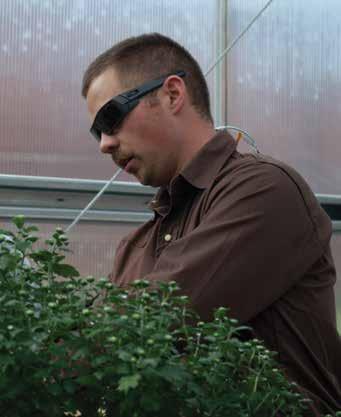
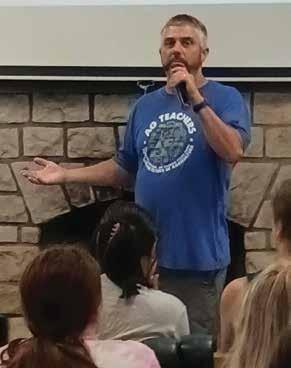
State & Region IV NAAE Winners
Teacher Mentor: Nick Nordwald, Sikeston
Outstanding Service: Heather Eberlin, State PD Specialist
Teachers Turn the Key Scholarship: Jacob Blank, Eldon
Jess Clonts Memorial Scholarship
Cole Jackson, Neosho
Lifetime Achievement
Jim Spencer, DESE
Outstanding Ag Educator
Dean Reichel, New Bloomfield
Outstanding Ag Ed Program
Seneca
Outstanding Early Career Ag Ed Teacher
Tim Davis, North Shelby
Teaching agriculture is more than just a job, it is a career that provides you with the opportunity to make an impact in the lives of others. Teaching agriculture allows you to educate students on agriculture, develop soft skills for future careers, help them become educated consumers, and prepare them for the future.
Deanna Schnuck, Agriculture Instructor
Boonslick Technical Education Center
The Missouri FFA Foundation and Missouri Agricultural Education appreciates the support of these presenting sponsors:
Missouri Ag Ed Calendar—Cutting Edge Curriculum
Missouri Ag Ed Teacher Directory—Missouri Farm Bureau
eorge Frees is no stranger to agriscience research. His successful Supervised Agricultural Experience research project that focused on increasing ethanol biofuel production from sugarcane to provide a sustainable energy source opened a world of opportunities and has earned Frees many awards and recognitions, most recently the 2023 American Star in Agriscience.
“Being named the 2023 American Star in Agriscience was an incredible honor,” Frees says. “It certainly validated the hard work and dedication I have put into my research, but the most important aspect for me was showing everyone who helped me along the way that their kindness and support had paid off.”
After dedicating many years to this research, his passion for the results has only grown.
“Initially, my goal was to explore ways to enhance biofuel production from agricultural crops, but as I delved deeper into the research, I realized the broader impact this work could have on global energy poverty while keeping greenhouse gas emissions low,” Frees explained.
“This shifted my focus from merely improving production techniques to addressing the larger issue of sustainable energy access in developing countries.”
Frees is currently a senior at the University of Missouri studying ethnobotany while majoring in biochemistry and plant sciences. Some of his current research includes investigating potential uses for non-proteinogenic amino acids in various plants and exploring bioluminescence as a marker for genetic modification in plants.
“Looking forward, I aim to continue my ethnobotanical research, with a focus on discovering new plant-based pharmaceuticals to get ahead of the spread and emergence of diseases,” Frees says. “I also hope to demonstrate the usefulness of plants and advocate for the protection of natural environments to preserve plant and animal species that reside within. This collaborative nature is what helped Frees find his niche in the ag industry, he says. He hopes to provide that collaboration to others in the future through a career in academia.
“It is so important to recognize and give back to those who help you. None of my achievements would have been possible without the support and guidance of others in my community, from my FFA advisors to my friends at school. I am eager to continue learning and growing in this field and helping others to get where they want to go.”
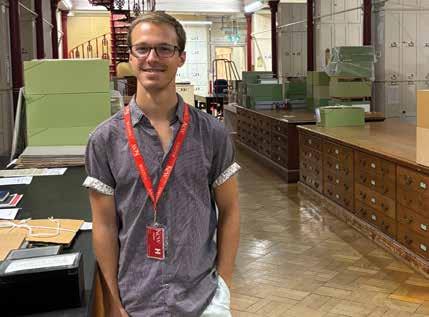
CanAm, we like it when our passion and profession come together. Agriculture is near and dear to the heart for much of our team and we know the CanAm Defender is one of the most capable and versatile vehicles for farm use. It seemed natural for us to donate to the Missouri FFA Foundation. This was our first year as a sponsor and I have to say, we were impressed at the scope of visibility we received by supporting the foundation. Whether it was having one of our vehicles onsite at the Missouri FFA State Convention, our videos playing at the Young Farmers State Convention, or the Missouri FFA State Officers wearing our logo on the sleeve of their polos as they go about their official duties, our sponsorship put our brand in front of thousands of people.


Stefan Defosses Zone Leader, Missouri

